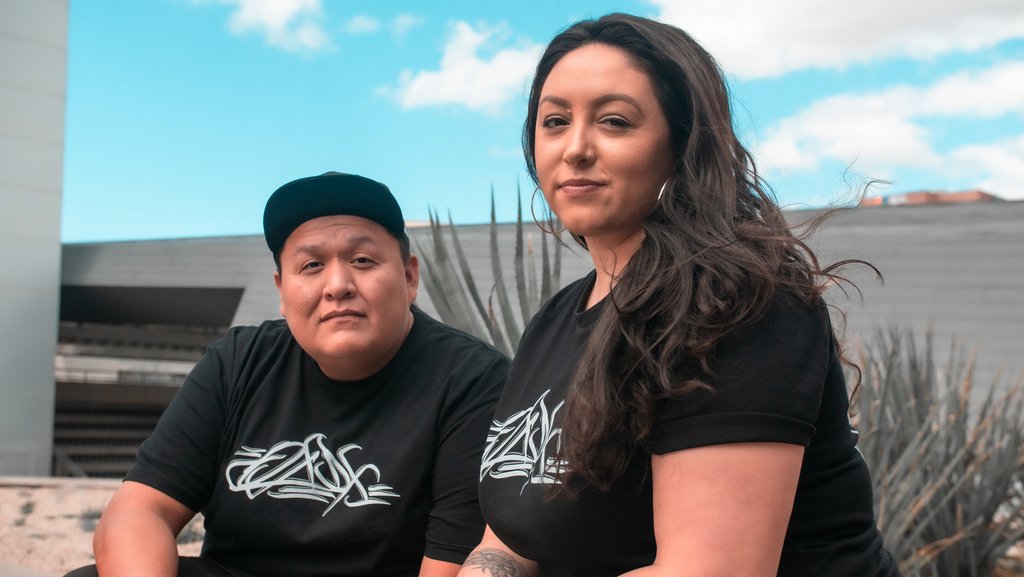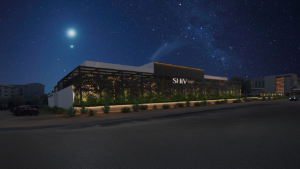All-purpose bleached flour, multi-pound blocks of cheese, lard, canned meat: these foods became staples of Native American homes and diets after being placed on reservations.
A sack of flour and familiar brick of cheese are present on OXDX Clothing’s latest t-shirt titled “Government Assistance Not Needed,” a stylistic twist on the irony of government-provided food in the aftermath of indigenous displacement and relocation. The shirt served as a promotion for All Ages Pizza, a Navajo-owned pop-up restaurant based in Chandler, Arizona.
OXDX Clothing, owned by Navajo artist and designer Jared Yazzie, is based out of Tempe, Arizona, and specializes in graphic art and screen-printed apparel inspired by Native American culture and indigenous issues.
The apparel uniquely blends visually appealing and fashionable designs with indigenous activism.
READ ALSO: OXDX streetwear designer brings awareness to Native American issues
“There seems to be a lot of issues and a lot of fights out there that we have to endure, and we have to do it together,” Yazzie said. “Everything we make here we try to make it purposeful; I’ve felt like that since college, that I needed to be purposeful in what I did. It always relayed back to community, it always relayed back to our people, history and culture and what we have to hold on to.”
Originally from Holbrook, Arizona, just outside the Navajo Nation, Yazzie’s mother Shirley is a math teacher, and his brother Aaron works at NASA Jet Propulsion Laboratory in Pasadena, California, where the Mars 2020 Perseverance rover was developed.
Yazzie initially attended University of Arizona for engineering, but took a different path toward graphic design, art and screen printing, skills of which have been mostly self-taught. A deviation from his math-oriented family.
During his time at UArizona, OXDX’s roots began as discussions between fellow native students opened his eyes to the inequities Native Americans face.
 “You start to notice things; you start to notice differences. Or the way things shouldn’t be,” Yazzie said. “It wasn’t until college that I really opened my eyes to what was weird about everything and about how racism and border town racism existed and how we just kind of dealt with it; it was normalized.”
“You start to notice things; you start to notice differences. Or the way things shouldn’t be,” Yazzie said. “It wasn’t until college that I really opened my eyes to what was weird about everything and about how racism and border town racism existed and how we just kind of dealt with it; it was normalized.”
His apparel reflects the modern juxtaposition of Native American culture among contemporary American culture.
At the onset of the COVID-19 pandemic last year, Yazzie and OXDX took measures to avoid transmission and remain safe while remaining in business, such as moving operations from their warehouse in downtown Tempe to their home. Masks were worn, gloves donned, and a part of their home was sectioned off to pack and ship orders.
“I just didn’t want to be responsible for spreading anything to anyone else, it was a personal commitment to not do that, capitalism or not,” Yazzie said. “Because you could just see other businesses wanting to open because they needed money and we knew it was unsafe, so we didn’t want to be influenced by it.”
OXDX’s shift to increasing online sales had Yazzie reconsider various business model practices that they will continue to do.
When many other local businesses struggled with revenue and uncertainty, OXDX was able to get by with Yazzie taking on graphic design jobs that he previously wasn’t able to take due to frequent traveling.
At the height of COVID-19’s November 2020 surge, nearly 75% of small businesses in Arizona were negatively affected by the pandemic, according to data from the Small Business Pulse Survey conducted by the U.S. Census Bureau.
Small businesses continue to experience negative effects but have been lessened by vaccine deployments and the easing of restrictions.
Yazzie hopes to eventually resume their in-person events such as youth workshops, food pop-ups, Sunday brunches where the community could come in to screen print personal items, and hosting fashion shows.
“We had some interesting things lined up,” Yazzie said. “It’d be nice to connect with people again.”
OXDX Clothing will be celebrating 12 years of design work on May 5 with a special, colorful design appropriate for spring and summer, a departure from previous designs that are primarily set against black backdrops.




